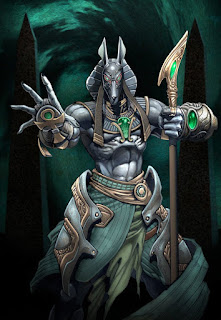God of Death and Mummification: Anubis

Lord of the Funerals Keeper of the Ways of Death God of Burial and Embalming God of Cemeteries and Mummification Anubis is known as the god of death and is one of the oldest and most popular of ancient Egyptian deities. The ancient Egyptians revered Anubis highly because they believed he had tremendous power over both their physical and spiritual selves when they died. References to Anubis are found in texts dating back to the Old Kingdom. His fame lasted until the Middle Kingdom, when his role as God of death was taken over by Osiris and Anubis became Osiris' assistant. Nephthys: his mother He is the son of Nephthys and Set or Osiris. It was believed that his aunt Isis raised him, rather than his mother Nephthys, as Set might murder his wife's illegitimate son or be a horrible influence on him. Thus he grew up as a son, friend and follower of Osiris and Isis. Despite the fact that he was given to Osiris and Isis to raise, Anubis is aware of his true par...





